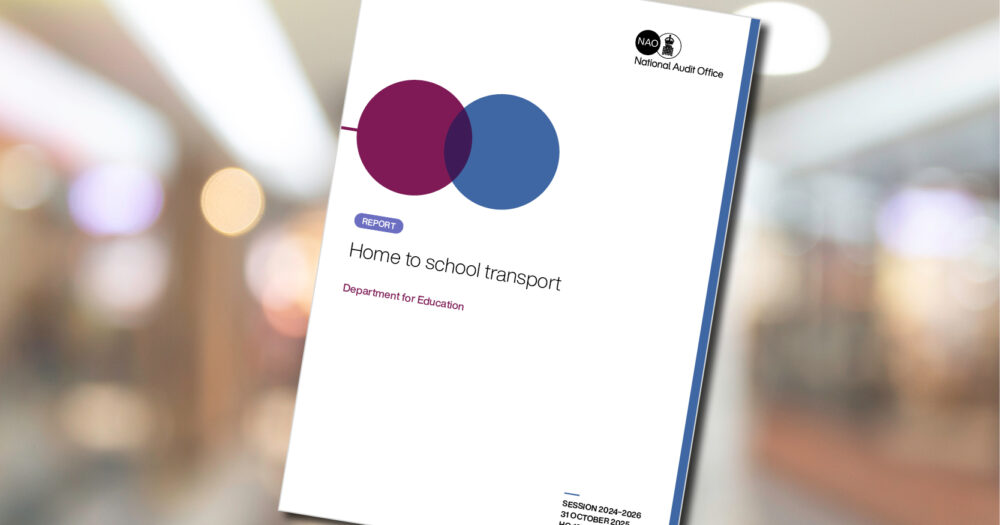The UK’s spending watchdog has urged the government to improve its “insufficient” data collection on SEND transport amid risks that councils “scaling back” their post-16 provision could increase NEET numbers.
The National Audit Office (NAO) warned in a new report today that council cost pressures from providing transport for people up to age 25, which soared 106 per cent in real terms over an eight-year period, could place a “significant barrier” on participation in education and training, particularly for young people with SEND.
The Department for Education (DfE) told the NAO it is planning to make it mandatory for local authorities to routinely report home-to-education transport usage after one quarter failed to provide metrics on a voluntary basis.
The government estimates that around 50,000 post-16 learners receive council-funded transport, based on a data collection exercise back in February to 153 local authorities in England, published earlier this week.
But the estimates were based on a 75 per cent response rate, which extrapolated 16-25 population averages to estimate the number of eligible learners in the councils that didn’t respond.
DfE asked local authorities to categorise spending, pupil numbers and modes of transport according to the grounds on which a pupil was eligible for transport.
The NAO said there were “differences” in how councils record the data, making it difficult to draw “firm” conclusions or make comparisons.
It also recommended DfE work with councils to increase the response rate and improve the accuracy and comparability of data and the systems they use
The NAO added: “[DfE] aims to make the collection mandatory in future years, but it is not yet known whether home-to-school transport metrics will feature in the local government outcomes framework – designed to measure progress against national priorities – which the government is currently consulting on.”
The final framework is expected to be published later this year.
Ruth Perry, senior policy manager at specialist college association Natspec, said: “There is clearly work to do here for DfE in improving the data set, particularly if it’s going to be used to support national policies as part of wider SEND reform.”
“The one key change we’d like to see is the statutory duty to provide transport support extended so that it brings into scope 16 – 18 year olds and 19 – 25 year olds with an EHCP. While there was once a logic to having age 16 as a cut-off point, it is now totally arbitrary and rationing access to transport support in this way, rather than by need or family circumstance, is no longer tenable,” Perry added.
Last week, education secreary Bridget Phillipson revealed the schools white paper, which will set out reforms to the whole SEND system, has been delayed and will now be published “early in the new year”.
‘Reforms must address transport pressures’
Councils have increasingly struggled to allocate specialist provision for 166 per cent more children and young people with education, health and care plans (EHCPs) over the last decade.
There were around 639,000 children and young people up to age 25 with EHC plans as of January 2025.
Combined with young people travelling further to institutions that meet their specialist needs and needing single occupancy vehicles, like taxis, council spending on transport has soared.
Local authorities spend five times more on transport per child with SEND than on other children. In 2023-24, on average, transport for a child with SEND cost £8,116 compared with £1,526 for ‘mainstream transport’.
As a result, the NAO said the government’s current reforms to support more children with SEND in mainstream schools must address the home-to-school transport pressures.
But Pepe Di’Iasio, general secretary of the Association of School and College Leaders, said he was “concerned” the national conversation about SEND learners has become focused on cost.
“Let’s be clear that these youngsters often require special school provision and home-to-school transport is vital in ensuring they are able to access that support,” he said.
He added: “We have to put the needs of these youngsters first and ensure that the SEND system and associated costs are sufficiently funded both now and in the future.”
NEETs will rise
Councils are not legally required to provide free transport for 16-18 learners or 19-25 aged learners with EHCPs, but can provide travel allowances, shared transport or personal travel budgets. Some have introduced parental financial contributions for council-arranged transport.
“There is no breakdown available on why local authorities provide transport for young people over the age of 16 as this is largely discretionary,” the report said.
The NAO urged DfE to work with councils to understand the impact of changes in policy for discretionary transport on, for example, attendance and NEET figures.
Natspec is calling for the statutory duty to provide transport to be extended to 16 – 18-year-olds and 19 – 25-year-olds with an EHCP.
“While there was once a logic to having age 16 as a cut-off point, it is now totally arbitrary and rationing access to transport support in this way, rather than by need or family circumstance, is no longer tenable,” Perry said.
The NAO interviewed 10 local authorities who had all withdrawn or restricted free or subsidised transport for young people.
The report warned that where discretionary services have been cut, some students may miss out on learning, or parents may have to adjust work or give up work altogether to get their children to school or college.
“Yet there is currently insufficient data to judge how any changes to home-to-school transport might impact attendance,” the watchdog said.
Latest Office for National Statistics figures estimated 948,000 young people aged 16 to 24 were NEET, the highest rate since 2014.
“The impact may be felt more by disabled children and young people, who tend to travel further to their educational setting, often cannot travel independently and may need to be in education or training for longer,” the report said.
Gareth Davies, head of the NAO, said: “For the children and young people that rely on local authority-provided transport to get them to school and college each day, it is an invaluable service. Without it, many may struggle to continue with their education.
“Local authorities are making savings to meet their statutory duties, but they are looking to DfE’s upcoming SEND reforms to ensure the long-term sustainability of home to school transport.”
A Natspec survey last year of 66 specialist colleges found nearly two-thirds (65 per cent) of colleges said transport issues had resulted in some learners with SEND being unable to attend college or attending intermittently.
An FE Week investigation found cases of disabled students neglected by council-arranged taxi drivers after the survey found four in 10 of colleges thought the transport was unsafe.
A Department for Education spokesperson said: “This government inherited a SEND system on its knees, with thousands of families struggling to secure the right support.
“Work is already underway to make sure more children with SEND can achieve and thrive at their local school alongside their peers – including investing £740 million to create more specialist school places and increasing access to early support for speech and language needs.
“We’ll set out the full Schools White Paper in the new year, building on the work we’ve already done to create a system that’s rooted in inclusion, where children receive high-quality support early on and at a school close to home.”
















Your thoughts